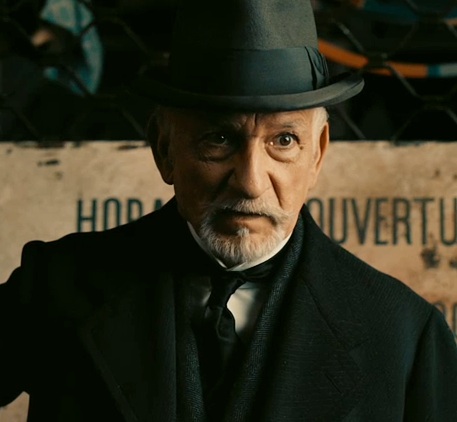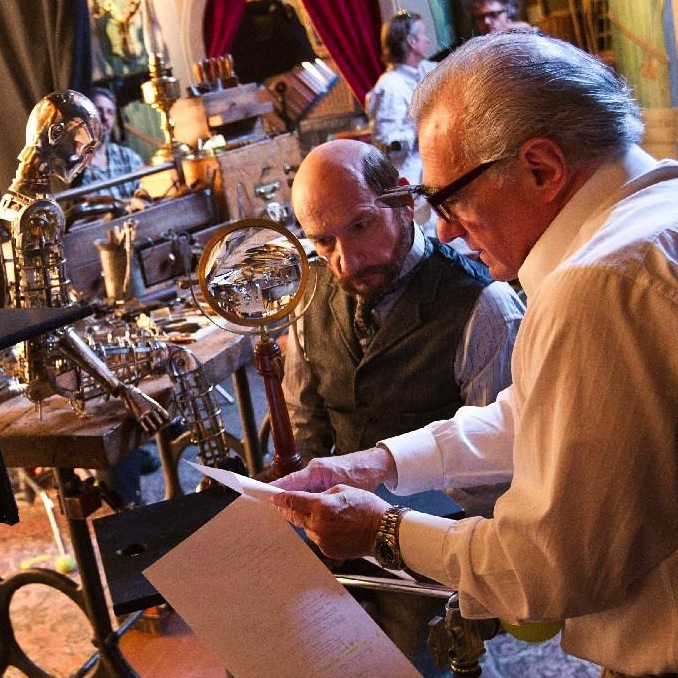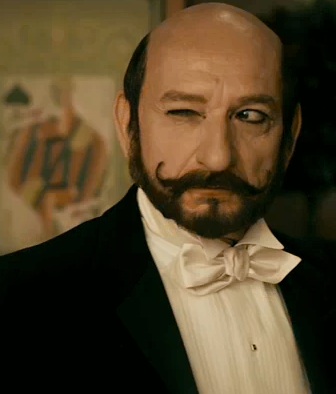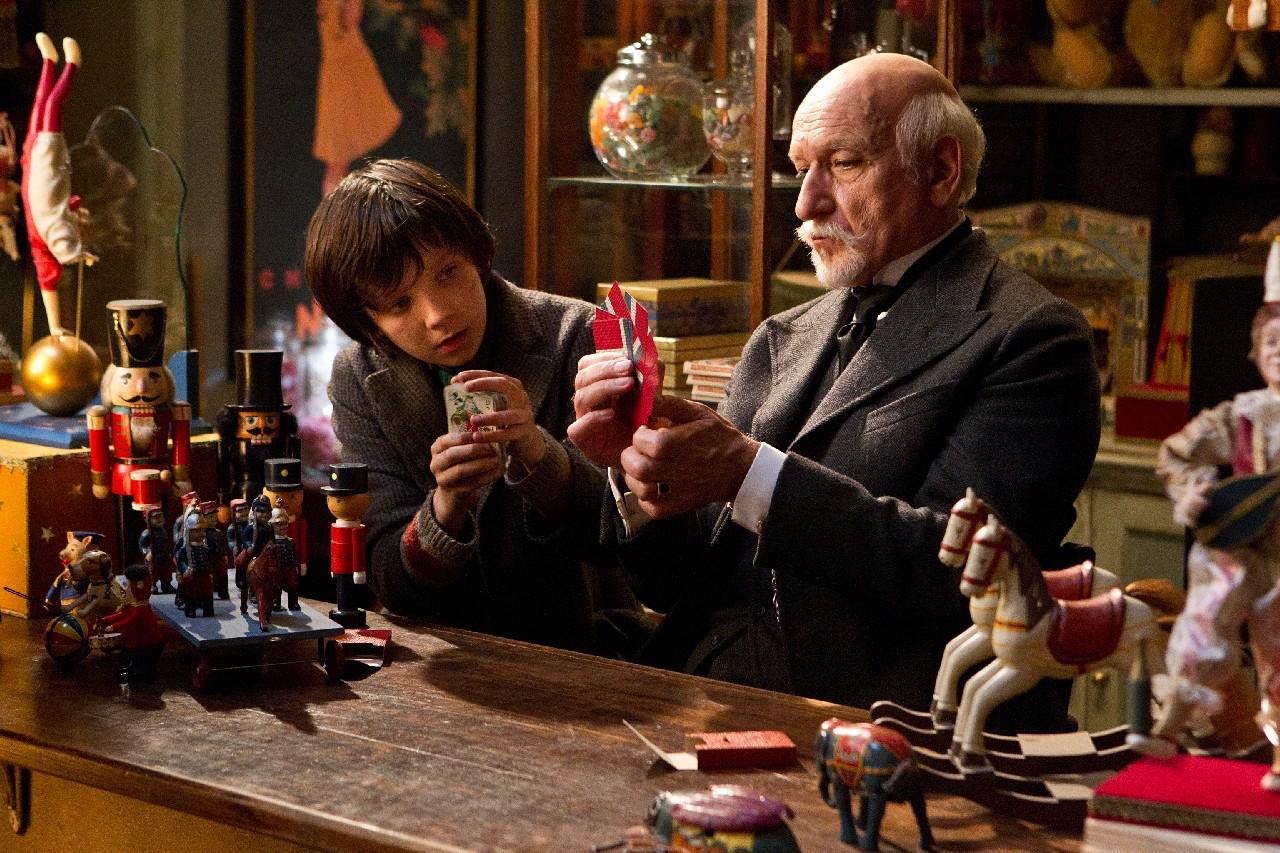 Sir Ben Kingsley continues to be one of my favorite actors, simply because you never know where he’s going to turn up next. In his lengthy career, he’s done high drama, lowbrow comedy, flashy action movies and character-driven indies. He’s a four-time Oscar nominee (who won Best Actor for his work in 1982’s Gandhi) who doesn’t mind starring in the occasional video game (Bloodrayne, Prince of Persia) or cartoon (Thunderbirds) adaptation. He’s a guy who loves what he does and it comes through 100% in his performances.
Sir Ben Kingsley continues to be one of my favorite actors, simply because you never know where he’s going to turn up next. In his lengthy career, he’s done high drama, lowbrow comedy, flashy action movies and character-driven indies. He’s a four-time Oscar nominee (who won Best Actor for his work in 1982’s Gandhi) who doesn’t mind starring in the occasional video game (Bloodrayne, Prince of Persia) or cartoon (Thunderbirds) adaptation. He’s a guy who loves what he does and it comes through 100% in his performances.
Kingsley’s next role is in Martin Scorsese’s magical ride to 1930s Paris and loveletter to cinema and imagination: Hugo. The actor plays Papa Georges, a toy store owner who takes young Hugo under his wing. But beneath his stern exterior lies a mystery, slowly unraveled by a curious and savvy Hugo. A beautiful, touching story, Kingsley delivers another powerful performance. I had a chance to speak to him on working with Martin Scorsese for a second time, digging deep into his character (the reveal is a a minor spoiler, so you may want to come back and read it after you see the movie!) and why the actor hasn’t read a review in over 20 years:
So this is the second movie that you’ve worked with Mr. Martin Scorsese on…
Sir Ben Kingsley: Yes it is!
Did your working relationship change for this movie? Did the process adapt to the particular material?
BK: Well, what I learned was that he might have made this before Shutter Island. I thought to myself, ‘Thank Heavens he didn’t!’ Because it might not have been me. In either of his movies! So, fate was on our side, and during Shutter Island we did establish a really lovely rapport. Not quite a shorthand because we enjoy talking so much. We’d rather say the longer version.
I imagine it’s fun to talk to Martin Scorsese about movies.
BK: Yeah, it is! And acting, and also sanity, insanity, the healing man. He’s fascinated by healing. Both Shutter Island and—I keep wanting to call it The Invention of Hugo Cabret—and Hugo are about healing, really. Hugo, miraculously, is this tiny human being who heals his own universe and recreates his own universe. He’s an orphan who ends up in a home: a loving, decent, solid, real home. He’s adopted by Georges and Jeanne, and becomes Isabelle’s adoptive brother, really. But Martin, in both places, was his collaborative, joyful, enthusiastic, questing, curious, laughing self. Although there was less opportunity in Shutter Island, decidedly, to hear him being surprised, it would come later when he’d leave his wonderful black box and monitor…[he] always comes out to talk to the actors, take after take after take, and then goes back. Not everyone does this, he does. But in Hugo, when we surprised him, we would hear this wonderful laugh! Roaring out of his black tent! And he’s the best man in the world to bring a surprise to.
And Sacha Baron Cohen is very inventive. All this…you know, the prosthetic leg, and everything—the leg being stuck in the train door. All that was invented by Sacha. I had less leeway to invent things.
 Because you were playing someone real? Because you’re going through more of a destructive experience?
Because you were playing someone real? Because you’re going through more of a destructive experience?
BK: Yes, and in the opening scenes of the film, and through quite a lot of the film—aside from that glorious sequence where I am Georges Méliès fully empowered—
Right. Which is an amazing scene.
BK: Beautiful. In my glory…Georges does not want to live. So I had to find a body language and a voice and makeup and costume, and such a stillness. Almost Georges’ subtext is, ‘Don’t wake me up. It’s too painful.’ And the little boy says, ‘Wake up, wake up, wake up, wake up!’ And I say, ‘No, no, no, no,’ over and over again. I will not enter the world. But I’m pulled into the world by that child, so I fully had to appreciate what Georges had lost in order to get that.
Do you feel like you gained that from reading about him or watching his film’s again?
BK: Well, watching his films, certainly. But I really, really, viscerally gained it by Marty giving me those amazing scenes where I could be Georges directing, Georges the king of his kingdom…
Were you able to shoot those early on, or were those kind of interspersed?
BK: Not too early on, but they came at a good time. But I always had a sense, having read the script, and having looked at his early movies, just how terrible that loss was. How really sad the guy in the toy shop is. Not just a little bit sad. Deeply depressed.
In some ways, what reawakens Méliès is an audience’s adoration, a love for what he has crafted. Thinking about yourself as an artist, do you feel like that audience reaction is important to your own work’s continuation? Is that an important part of having the energy to perform?
BK: The audience reaction…it is. But I think, my primal motivation is not the audience’s reaction, but the joy of telling the story. I love telling stories. Whether it’s through my acting, or whether it’s in life, or whether it’s writing them down as a poem or an observation. I think I’ve carved out my little psychological niche as a tribal storyteller. It’s very humbling, and it has its responsibility. But I get a great deal of joy out of telling the story. And not as much joy in ‘How am I doing?’ I think that ‘How am I doing?’ can be a bit destructive, and limiting.
For example, if I wanted to be…audience reaction is a dangerous second cousin to ‘I hope the audience loved me.’ And [with] Georges, I had to take the risk—and Dr. Cawley, and quite a few guys I’ve played—where I had to say to myself, ‘I don’t care whether the audience likes me or not as long as they hear the story.’ I’m part of little Hugo’s life, and I have to be the dark force that he brings back into the light. I can’t sugarcoat it.
 But even when you play someone nefarious, or when you play someone delightful, I think people will still have an honest reaction of “’That’s a great performance! That’s great acting!’ Are you able to embrace those feelings? Does that strengthen you?
But even when you play someone nefarious, or when you play someone delightful, I think people will still have an honest reaction of “’That’s a great performance! That’s great acting!’ Are you able to embrace those feelings? Does that strengthen you?
BK: I never read anything. I haven’t read a review since, I think, 1985. I have not read a review since then.
What movie?
BK: It wasn’t. I was onstage. Actually, it was after Gandhi, but I went back to the theater, and, to be quite candid, I read two reviews—was it two reviews? I was in two different theaters playing the same performance…I somehow realized, they actually wrote it on the bus on the way there. It’s got nothing to do with what I was doing! It’s prejudiced, it’s preconceived. It’s their own narrative, which they are stamping onto…so I just stopped. It helps me sleep at night. But I love, when I’m out and about in New York, I love it when people say, ‘I love your work.’
A welcome thank you.
Yeah, that’s sweet. Rather than read paragraphs of something that’s going to have me waking up in a cold sweat. Why did they say that?!
Kind of switching gears, they shot the movie in 3D. Have you done a 3D movie before?
BK: No. What a blessed baptism. It was my first.
 Hugo is one of the best 3D films I’ve ever seen, but is shooting in the format a pain in the ass?
Hugo is one of the best 3D films I’ve ever seen, but is shooting in the format a pain in the ass?
BK: What we did have is long turnarounds. There was a hiatus between changing the camera or the lens. But it did give all of us an opportunity to walk around that extraordinary set.
It is amazing!
BK: I stayed in character, and I used to wander around the set. The bookstore was full of amazing books…and the patisserie, the café the travel bureau…everything was so vividly alive. It was beautiful. 3D is—a 3D camera, for me, I can only describe as an x-ray camera. It can see inside what you’re thinking. So I had to be very accurate and quite modest in my performance.
Yeah, I was wondering if you’d have to kind of tailor yourself to it.
BK: You can’t show off with a 3D camera. And you can’t pull any tricks as an actor. And Asa [Butterfield]’s performance can be very steadied, because he acts from the heart. There are no filters for him. It’s straight from the heart, straight from the gut. What you see is that little boy in distress, or laughing, or happy, or curious. But that’s it. And it responds it back. And a 3D camera, and Mr. Scorsese, only want that ‘it’ factor. They don’t want anything else, they want the truth.
Looking ahead for you—you shared with Sacha in this movie, but now you’re co-starring with him in The Dictator…
BK: Just finished.
I have absolutely no idea what to expect from that crazy sounding movie. What is your role and does it feel like a departure for you?
BK: I love doing comedy. I always have. I started out doing a lot more comedy in theater, onstage, than I do now. And I try and incorporate that wit in everything I do. I think I’m the straight man to Sacha, thank God. Don’t try and be funny around Sacha, it’s a wasted exercise.
Who do you play in that movie?
BK: I play—he plays a dictator, North African—and I play his head of security, and his procurer of women.
Oh dear.
BK: Yeah. Fantastic job!
=”font-style:>



